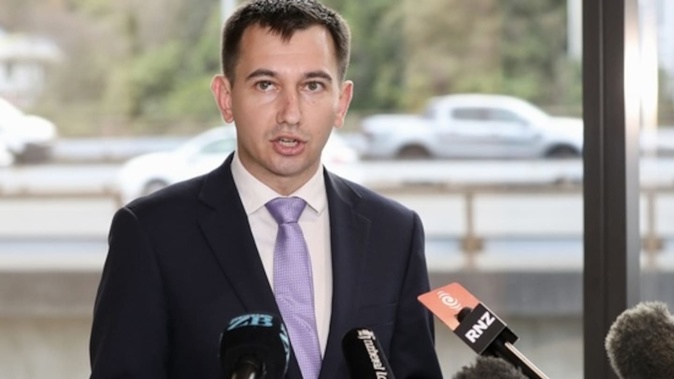
- Local Government Minister Simeon Brown has requested advice on potential interventions at Wellington City Council after a controversial vote.
- The council’s vote to stop selling its 34% share in the airport could lead to $600m in capital spending cuts.
- Prime Minister Christopher Luxon expressed deep concern over the council’s financial management and dysfunction.
Local Government Minister Simeon Brown Minister has asked officials at the Department of Internal Affairs for advice on potential interventions at Wellington City Council following a vote last week by the council to stop the controversial sale of its 34% share in the airport.
The vote means the council will need to amend its Long-Term Plan and cut up to $600 million in capital spending to create additional debt headroom to respond to insurance risks. The decision could also have an impact on rates, with Wellington ratepayers already facing some of the steepest increases in the country.
The Long-Term Plan had previously been agreed but last week’s vote has forced the plan to be reopened. This has an implication on service and rates levels.
Brown said the Government has “asked for advice in terms of interventions. We haven’t received that advice yet, but we are very concerned because it looks like a shambles”.
Brown said there was a “threshold that needs to be met in terms of any potential interventions”. He said officials would be advising him on those thresholds.
“Ultimately, this is concerning for Wellington ratepayers who are looking at this and asking, ‘what does this mean for my rates bill – I’m already facing some of the highest rates in the country, is that going to make them go up even further,” Brown said.
Brown said he was looking at options under Part 10 of the Local Government Act. These include formal requests for information from the council, appointing a Crown observer, a Crown manager, or even a Commission.
Brown said there was a “high threshold” for intervention because the council had been democratically elected.
“They are voted by Wellington ratepayers to make decisions so any intervention has a high bar,” Brown said.
 Wellington Mayor Tory Whanau supported the sale. Photo / Mark Mitchell
Wellington Mayor Tory Whanau supported the sale. Photo / Mark Mitchell
- "We're pretty concerned": PM signals potential intervention in Wellington City Council
- 'Shambles': Finance Minister Willis hits out at Wellington Council
“The legislation requires that there be what is considered ‘significant problem’ – that is a judgment call I have to make,” Brown said.
He said he would not give a timeframe for making a decision.
Prime Minister Christopher Luxon laid into the council this morning, saying he was “deeply concerned” about it.
“We’re concerned about the financial management, delivery of the Long-Term Plan and frankly Council dysfunction, we’ve been monitoring it closely and I know Simon Brown is taking advice on it,” Luxon said.
Luxon said the council was “not serving Wellington well”.
Labour was less sure about what intervention was required and argued the Government was attempting to distract from the fact its public service cuts were harming the Wellington economy.
Labour leader Chris Hipkins said, “We have to allow for local democracy and there are going to be competing views on local councils.
“The fact that local councils have competing views doesn’t necessarily signal that there’s a need for intervention. Wellington City seems to have a lot of disagreement, but at this point, I don’t think the case has been made for any central government intervention,” Hipkins said.
Hipkins said the Government needed to make a distinction between what was robust and open debate between democratically-elected members and dysfunction requiring intervention.
“The council is still making decisions in Wellington so I don’t think the case for intervention is there at this point, but we should keep an eye on it. Wellington City does have some big underlying issues there around the state of its infrastructure and these are built up over a long period of time not necessarily to do with the current council, but I don’t think the case for central government interventions is there right now,” Hipkins said.
Labour’s Local Government Spokesperson Kieran McAnulty said the Government was itself partly to blame for high rates increases from Wellington City Council because it cancelled Labour policies that would have reduced the need for large rates increases.
“Look at the situation councils are working in. The Government cancelled the Affordable Water Reforms, they dismissed the recommendations from the review into local government, which would have provided councils with alternative revenue streams so at the moment all they have available to them is rates, so that’s why you are seeing rates rises across the country to an affordable level. This is a situation every council is facing,” McAnulty said.
McAnulty said there was no indication that the council was not meeting its statutory requirements, which was a threshold for intervention.
He questioned whether the umbrage directed at the council by the Government was based on advice or a rift between a right-of-centre government and a left-wing council.
“Are they acting on advice, or are they acting on reckons,” McAnulty said.
“Wellington has been hit hardest by what this Government is doing and they have tried to put the boot into Wellington City Council at every opportunity. Let’s not forget the offensive messages the Prime Minister said at the local government conference and picked on Wellington Council as an example.
“At the moment, none of us knows, if DIA has advised Wellington Council or any council for that matter are not meeting their statutory requirements then it would be appropriate to consider intervention but at the moment we haven’t seen that,” he said.
Wellington’s Mayor Tory Whanau, who had supported the sale, said that it would have “ensured financial resilience for our city”.
“Whilst I don’t agree with the decision to not sell the shares, I am just one vote around the table,” Whanau said.
“I am now singularly focused on delivering a long-term plan that delivers for Wellingtonians and offers the certainty they deserve.
“I am meeting with Councillors this week to work out exactly how we get there, and how we work cohesively together to deliver a Long-term Plan that does not compromise on our must-haves, that being housing, water and climate resilience, whilst also creating financial prudence for ratepayers,” she said.
Thomas Coughlan is Deputy Political Editor and covers politics from Parliament. He has worked for the Herald since 2021 and has worked in the press gallery since 2018.
Take your Radio, Podcasts and Music with you









